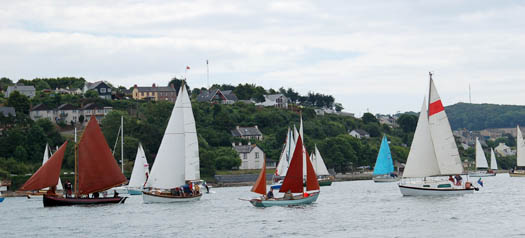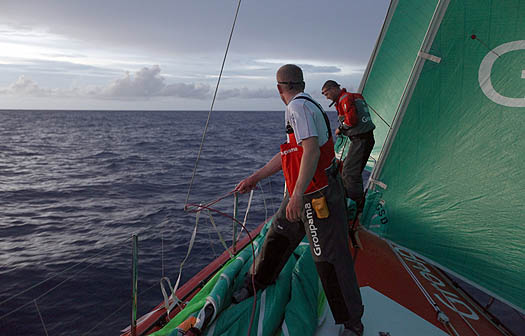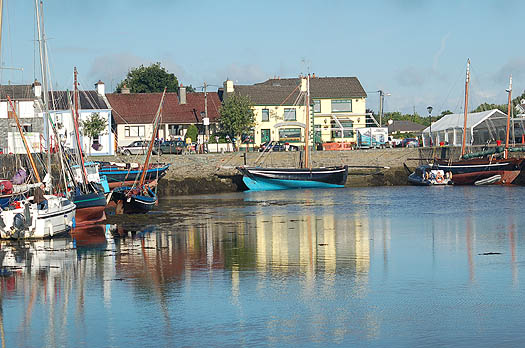#sailing – Sailing is a sport, not the qualification of a superior social standing.
Is that fully understood by everyone involved in the sport or is there still an element of elitism which needs to be eradicated?
The term 'yachting' was dropped a few years from the title of the national representative organisation which became the Irish Sailing Association, amidst an apparent belief that 'sailing' would be less elitist as a descriptive term and more acceptable to the public.
Most 'yacht' clubs did not become 'sailing' clubs, though there are more 'sailing clubs' it would seem than 'yacht' clubs around the country. Boats did not generally become described in the American term of 'sailboats' but remained yachts.
I see no major problem with the term 'yachting' though I understand the sensitivities which surround the different terminology. I have no qualms about admitting that I own a yacht and feel fortunate to do so.
What is of more concern to me is that the sport becomes truly a 'sport for all' and is not riddled with different levels of social strata.
There remains a degree of public perception that sailing is an elitist sport. This has dogged it gaining more general acceptance and bedevilled its reputation.
Sailing, or yachting, should be a 'sport for all' in an island nation where it is based on access to the magnificent resource of waters surrounding us.
The perception of wealthy people with big boats, sitting in clubs behind signs of 'strictly private', is not conducive to creating a widely popular sport. There is a dichotomy here because the growth of interest amongst young sailors, with more involvement in dinghy sailing such as through Optimists, has been encouraging. So has the advent of more interest in schools in adopting sailing onto their sports curricula.
The movement for change within the ISA came initially from the dinghy fraternity, where many of us who now sail cruisers, began their love affair with the sport.
The breakthrough which sailing needs, to gain more general popular public acceptance, has not been made.

People sail boats of all types
Why is this?
Throughout my years of being a marine journalist and when marine correspondent within RTE, it was difficult to get coverage for sailing. I did achieve it, but there was always a bit of a battle to establish acceptance that the sport was not just for the wealthier part of the population, but that it permeated across all social milieu. I did get that message across by quoting figures of how many are actively involved in a day's racing organised by major clubs, compared with the attendance for example at some Irish soccer matches which got plenty of media coverage. I also stressed that it was a participative sport more than a spectator one. More people within the broadcast service have become involved in the sport. But generally in the media, there is still an impression that sailing is a sport for which you need a lot of money and this is perpetuated by the oft-quoted unfortunate analogy of standing under a cold shower and tearing up money.
But sailing – and yacht – clubs are also contributors to this failure to get the message of sailing as a sport for all across. In my experience as a journalist, most clubs are poor at their public relations and the issuing of information to the press, but yet complain that the sport does not get enough coverage, even if they do not provide the information. There are honourable exceptions, who provide good circulation of information and websites, but there are many other clubs who are pretty bad at sending information and whose websites are dismal failures, not updated for long periods of time.
At the annual meeting of the South Coast Offshore Racing Association in Kinsale Yacht Club in the Spring one participant told the audience that "yacht clubs to most people would be the scariest places to walk into."
Another said: "It is no wonder that we struggle as a sport to keep people as lifelong participants, even though we can and do attract younger people into the sport at an early age."
The warning signs have been there for years, for those who wanted to note them. Sailing needed to widen its appeal, to get more people into the sport for lifelong participation.
To survive a sport needs an organised structure and clubs are needed to provide this, they must have members who pay to join and support them. They cannot exist if people use them without joining and therefore not giving on-going financial and volunteer support.
So there is a dichotomy here. Why are clubs not getting enough members, a situation which appears widespread?
The economy over the past few years has undoubtedly been a contributory factor. People have lacked disposable income and, amongst families in particular, expenditure on non-essential matters has had to be cutback. Some clubs have responded with different arrangements for membership, but as I wrote in this blog last week, I still think that new, flexible approaches are needed, particularly to encourage crews, of which most active racing boats are short.
There are also people who sail and who do not join clubs, either they don't want to, or can't or there are not clubs close to them or for whatever reason. But they do sail, are they outside of the system and should they be considered. How can they be appealed to because they are involved in the sport. There are the traditional boats and the huge support they get. Some are members of the ISA, some of clubs, but many not so perhaps. There is a huge level of support for sailing in this sphere and many organised events which draw big support. Should the ISA reach out to these sailors, to this area of sailing activity?
This and many other aspects merit consideration to band together all interested in sailing, in all its facets. United in approach there would be a strong force which official authorities could not ignore when improved facilities and recognition are sought or when government and officialdom has to be challenged, such as in the imposition of new regulations.
On this month's edition of my radio programme, THIS ISLAND NATION, (click to play podcast above) I talked to the President of the Irish Sailing Association about his plan for a Strategic Review of the sport to deal with a decline and he accepted my suggestion that the impression of elitism is not good for the sport and has not helped its expansion and development. We also discussed whether there was too much concentration on racing and whether more support should be given to other forms of sailing, encouraging cruising.
David Lovegrove wants to get across the message that sailing is open to everyone. He would be particularly happy, he told me, if he could get that understood and accepted widely in public. We discussed how sailing can be a sport for all ages and for all people, with the uniqueness of enabling families to participate together if they wished. He recalled the time when he first got involved in sailing and the enjoyment and sense of friendship that abounded. Perhaps too, we agreed, there was less concentration then on being winners in racing and in high performance levels.

Ocean racer Damian Foxall of County Kerry
I think there is a need for Ireland to have a good presence on the international scene and that it is good for the country. It is also good for sailors to aspire to the highest levels of achievement, but have we got over-committed to competition to the detriment of the enjoyment of participation, of being on the water. Had the ISA also been too focussed on its own high performance programme and those who qualify for it and not given enough support to other sailors who may not have made it through the ISA system, but want to try on the international scene and should there be arrangements to support that. Also, for example, has the ISA been close enough to the top international sailors who have come from Ireland and sought to include them and utilise their services in promoting Irish sailing, such as Damian Foxall and Justin Slattery and where is the ISA in regard to the efforts of such as young David Kenefick making his own way onto the international scene through the Figaro Race.
All of these are interesting points to debate.
I take part in club racing, but I always try to make it clear to the crew that we are going out to enjoy ourselves and winning is not the overall aim, though it would be nice and we have been fortunate enough to do so from time-to-time. I don't like shouting on a boat, though sometimes getting something done quickly when needed can raise the vocal level. But if the enjoyment is taken out of the sport, that is not for the best.

All forms of sailing need to be engaged
Again, here we have a dichotomy, other sports are hugely competitive-oriented, why should sailing not be?
There are issues to be addressed and I wish David Lovegrove and his team every success as they try to come up with answers. He told me in our interview, that this would not be a short-term solution, but would take a lot of work and commitment by the clubs themselves. Indeed. As I wrote in this blog last week, encouraging participation is essential to arrest decline. That will mean more innovative ways of involving people, a point which Denis Kiely, who has given tremendous national service to sailing made at that SCORA meeting in Kinsale and which impressed me.
He said that often crews did not get enough of a proper introduction to the sport, didn't have enough knowledge of it and weren't given such, didn't get training, could therefore feel unwelcome and then leave the sport.
Club marinas are pretty full of boats around the country, so it is at times hard to accept that there is a decline in participation, but the meetings which have led to the new approach by the ISA have shown problems, including dissatisfaction with the national association itself. David Lovegrove has accepted this and the need for change.
He spoke to me of his enthusiasm about the work ahead to re-define the sport and his confidence in the team he has appointed to oversee different aspects of the sport and to suggested changes. These are outlined in detail in the current/Summer edition of AFLOAT magazine.
His determination to create a strong, vibrant sport, is welcome. I wish him success with his efforts. Listen to his interview in my programme here on the Afloat website (above). Everyone interested in the future of our sport should respond positively. That commitment is what the sport needs.
So – who is to blame for the decline in sailing – all of us are, if we do not make changes to encourage more people into the sport and to stay in it and if we do not adapt existing systems to ensure they feel welcome. That means all of us who want to see sailing being a sport for all accepting that sailing is just that - a sport - not a badge of social approval.































































